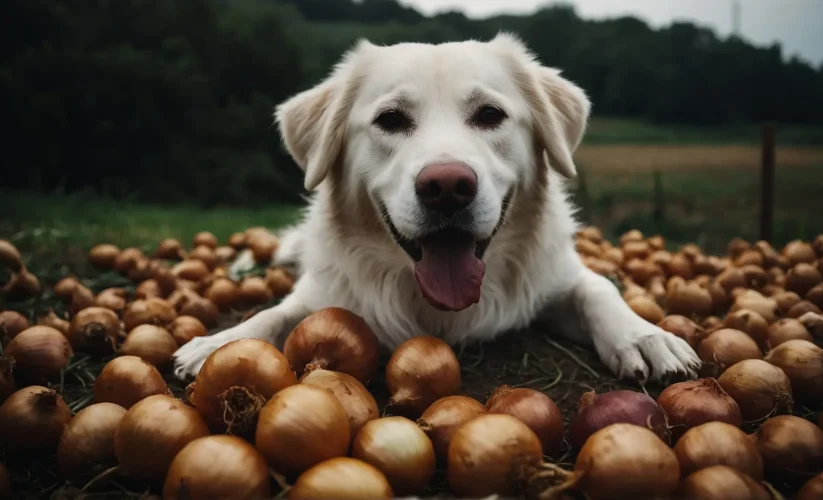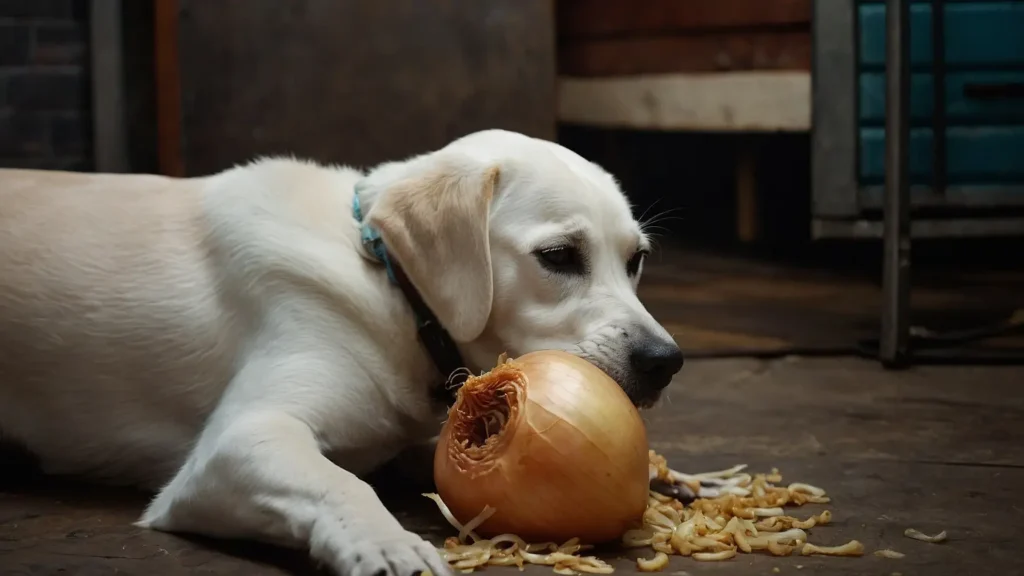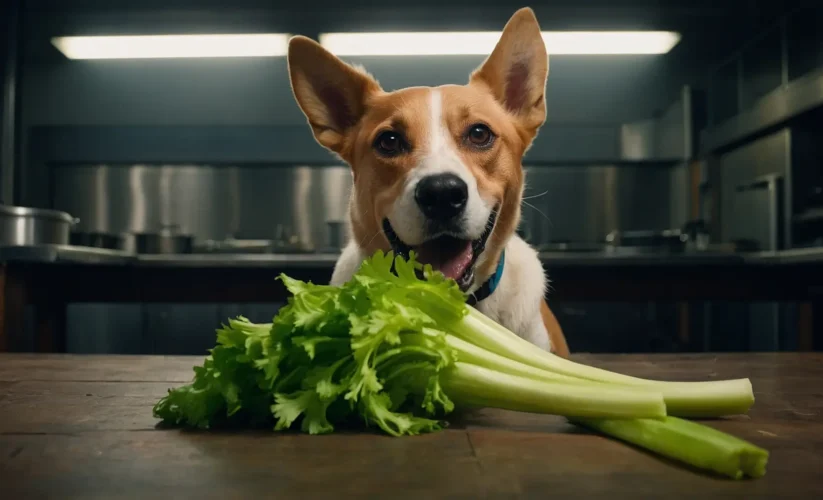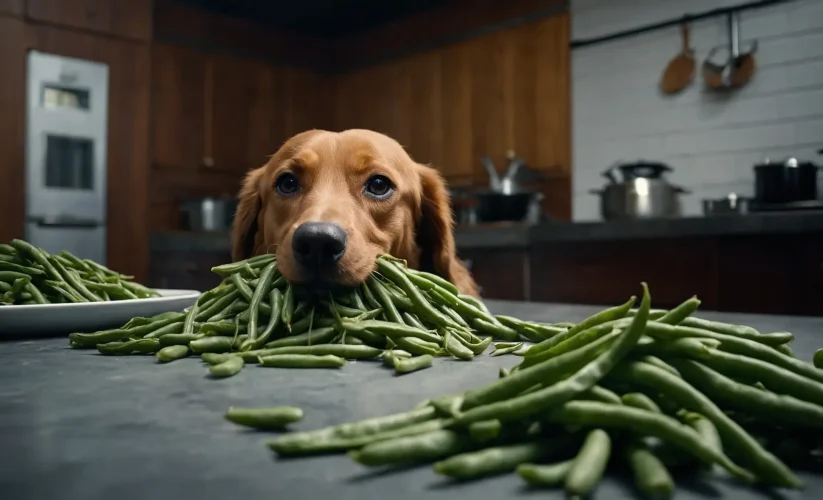Can Dogs Eat Onions?

As a devoted dog owner and experienced dog blogger, I’ve seen a variety of dietary trends and concerns come and go. However, one constant query that surfaces time and again is “Can Dogs Eat Onions?” This question is more than valid, considering our kitchens are often filled with foods that, while nutritious for us, may not be suitable for our canine companions. Understanding what’s safe and what’s not is crucial for maintaining our dogs’ health and well-being. In this blog post, we’ll dive deep into the topic of onions and their impact on dogs. We’ll explore whether onions offer any benefits, uncover their potential dangers, and also look at other vegetables like celery, carrots, and Brussels sprouts to understand better what’s safe for your furry friend. Let’s embark on this informative journey to ensure our dogs lead healthy, happy lives.
Is Onions Good for Dogs?
When considering onions for dogs, it’s essential to scrutinize any potential benefits they might offer. Onions, like many other vegetables, are packed with vitamins, minerals, and antioxidants that are beneficial for humans. They contain compounds that can boost digestive health, combat cancer, and improve heart health among humans. However, the canine body processes foods differently than the human body.
The primary question is whether these nutritional benefits translate to dogs and if they can consume onions safely to gain similar health advantages. The short answer is quite complicated. Dogs’ digestive systems are not designed to process certain compounds found in onions. While the theoretical benefits of antioxidants and vitamins in onions could suggest some level of utility, the risks associated with their consumption far outweigh any potential nutritional gains for dogs. Thus, it’s crucial to consider these risks before deciding to include onions in your dog’s diet.
Is Onions Bad for Dogs?
The discussion about onions and dogs typically leans towards the potential dangers, and with good reason. Onions contain a substance called N-propyl disulfide, which is toxic to dogs. This compound can cause oxidative damage to red blood cells, leading to hemolytic anemia. Symptoms of this condition include weakness, lethargy, pale gums, and even collapse in severe cases.

The toxicity of onions is dose-dependent, meaning that the more onions a dog consumes, the greater the risk of poisoning. However, even small amounts ingested regularly can be harmful over time. Furthermore, all forms of onions, whether raw, cooked, powdered, or dehydrated, pose the same risk to dogs. This highlights the importance of being vigilant about foods your dog consumes, including table scraps or foods seasoned with onion powder.
Given these risks, it’s clear that the potential harms of feeding onions to dogs far outweigh any possible benefits. The toxic effects can lead to serious health issues and, in some cases, may even be life-threatening. As responsible dog owners, our priority should be to avoid exposing our pets to such risks.
Are Other Vegetables Safe For Dogs?
In contrast to onions, many other vegetables are safe and can be quite beneficial for dogs. Let’s take a closer look at celery, carrots, and Brussels sprouts as examples.
Celery is a low-calorie vegetable that’s high in fiber and vitamins A, C, and K. It can be a crunchy, satisfying treat for dogs, helping to freshen their breath and contribute to their hydration due to its high water content.
Carrots are another excellent choice for dogs. They’re not only low in calories but also provide beta-carotene, which supports eye health, along with fiber for digestive health. Chewing on carrots can also help maintain your dog’s dental health by removing plaque.
Brussels sprouts, while less commonly considered, are also safe for dogs in moderation. These vegetables are rich in vitamins and antioxidants, providing similar health benefits for dogs as they do for humans. However, due to their high fiber content, it’s important to introduce them slowly into your dog’s diet to avoid gastrointestinal upset.
These examples illustrate that many vegetables can be safe and even healthful for dogs, provided they are given in appropriate amounts and prepared safely (e.g., washed thoroughly, cut into bite-sized pieces, and cooked without harmful seasonings).
Final Thoughts
When it comes to feeding our dogs, it’s paramount to prioritize their health and safety. While onions may offer nutritional benefits to humans, they pose significant risks to dogs, making them a food item to avoid entirely in a canine diet. The presence of toxic compounds in onions that can lead to serious health issues underscores the importance of keeping such ingredients out of reach of our furry friends.
On the brighter side, many other vegetables like celery, carrots, and Brussels sprouts can offer our dogs nutritional benefits without the risks associated with onions. These vegetables can be a part of a balanced, safe diet for our dogs, contributing to their overall health and well-being.
As dog owners, it’s our responsibility to stay informed about the foods our dogs consume. By understanding which foods are safe and which to avoid, we can ensure our dogs lead long, healthy, and happy lives. Always consult with a veterinarian before introducing new foods into your dog’s diet, and remember, when in doubt, it’s better to err on the side of caution. Our dogs rely on us for their care, and it’s our duty to provide them with the best nutrition possible.










